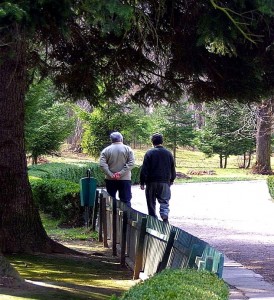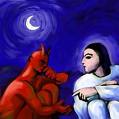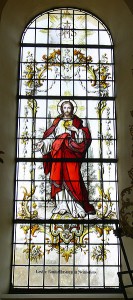Opening and Being Opened
On this anniversary of the tragedy known as 9/11, it’s all too tempting to circle the wagons, draw in our hearts and hands, refuse to risk reaching out to the stranger among us, set up barriers of Us vs Them, and otherwise behave in closed, angry, hostile ways. But that is not the way of Christ.
This past Sunday, September 9, Fr.Ron Shirley’s homily was on the reading from Mark’s Gospel 7:31-37: the healing of the deaf mute. His insights on opening and being opened by Christ are worth pondering.
Be Opened 9-9-2012
The Gospel of Mark is the oldest Gospel we have. There are many special things about it. One of the most special things is that it contains several original words of Jesus. Words in Jesus own language – Aramaic – that he must have spoken himself.
We have one of these words today, a very powerful word: Ephatha, which means “Be Opened.” Say it with me: EPHATHA!
Being opened is the opposite of being shut, of being clenched.
Do me a favor, will you. Clench your hands. Clench your hands as hard as you can and make fists. Keep it like that for just a few minutes, until I tell you.
A clenched fist gives a person a sense of power. We clench our fists when we get really mad, really frustrated, really full of hate.
A clenched fist is an ugly thing.
But not nearly as ugly as a clenched face. We clench our faces when we criticize too harshly, when we judge harshly, when we look down on someone or put out an arrogant attitude.
A clenched face is an ugly thing … but not nearly as ugly as a clenched heart. Our hearts get clenched when we are full of hatred and vengeance. Other things that can clench the heart are greed, envy, jealousy, or rage when we don’t get our own way.
(Keep your fist clenched a little bit longer)
Sometimes whole families can be clenched, whole parishes, whole communities.
And to the clenched community, the clenched family, the clenched heart, the clenched face, the clenched hand, the clenched ears, the clenched tongue, Jesus comes and says EPHATHA! BE OPENED!
I hope those of you who have clenched your hands are getting really tired. You should be. Now I’ll ask you to slowly, slowly unclench your hands: EPHATHA! BE OPENED!
Isn’t that better?
One day you will be completely unclenched. On the day when we rise to glory, it will be wonderful. We will be holding on to God completely and fully … because we won’t be holding anything else.
In the meantime, we Christians try to let go, little by little, of pains and wounds and regrets and resentment and anger. And Jesus is here helping us.
I close with this:
Jesus came to me. He saw that my mind was clenched. I can’t stand them. Those groups. Those people. That person. EPHATHA, he said BE OPENED! But I replied, Lord they hurt me. They threaten me. They violate me.
“I know, he said. Like the people who were cruel to me on Good Friday. My mind wanted to clench shut. The thought of them was like a crown of thorns tightening around my temples. But I opened myself up and God raised me, making me the Savior.”
Jesus came. He saw my hands were clenched. I’m not going to help another person. I’m not going to help the church anymore. I’m not going to reach out to my neighbor again. No one appreciates it.
“I know, Jesus said. Like the people who didn’t appreciate me. Sometimes when I opened my hands it felt like they were hammering nails through it. But I opened myself, and God raised me, making me the Savior of the world.”
Jesus came. He saw that my heart was clenched. So full of anger, so bitter, so jealous. Ephatha, he said. Be opened! I’m so tired of loving people. Often they don’t love me back. And when I opened my heart it feels sometimes like a great spear pierces me to my very soul.
“I know, said Jesus. Believe me, I understand. But when the spear pierced my heart, I opened myself to it, to the world, to the father … and God has raised me up.”
Ephatha! Be Opened! God will raise you up also!
Close your eyes; clench your fists – what else in your life is clenched?
EPHATHA! I am going to help you, says Jesus!
Fr. Ron Shirley, September 9, 2012
Read More




















